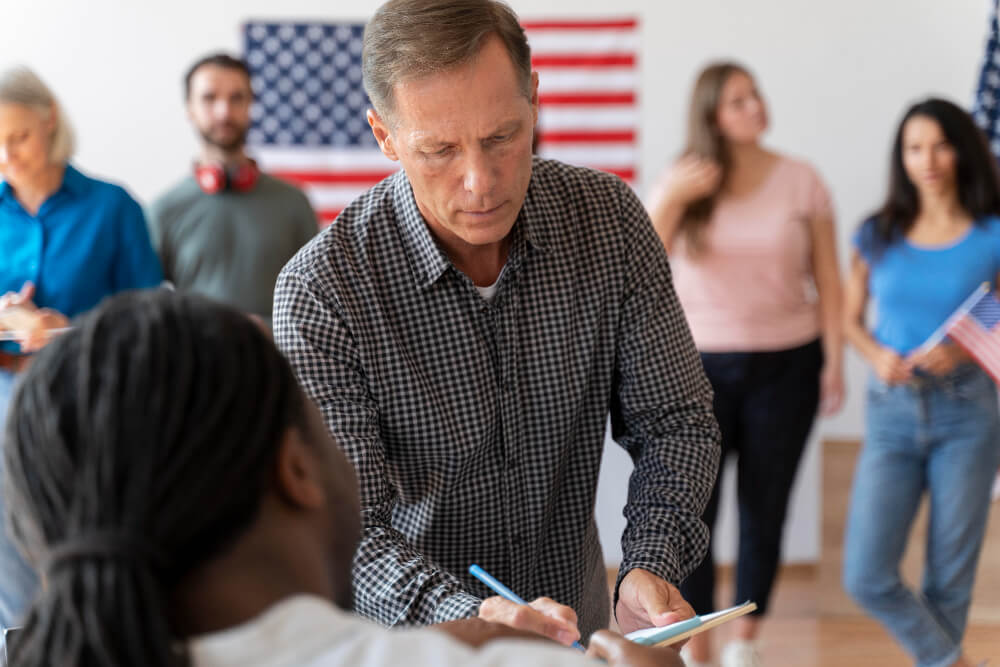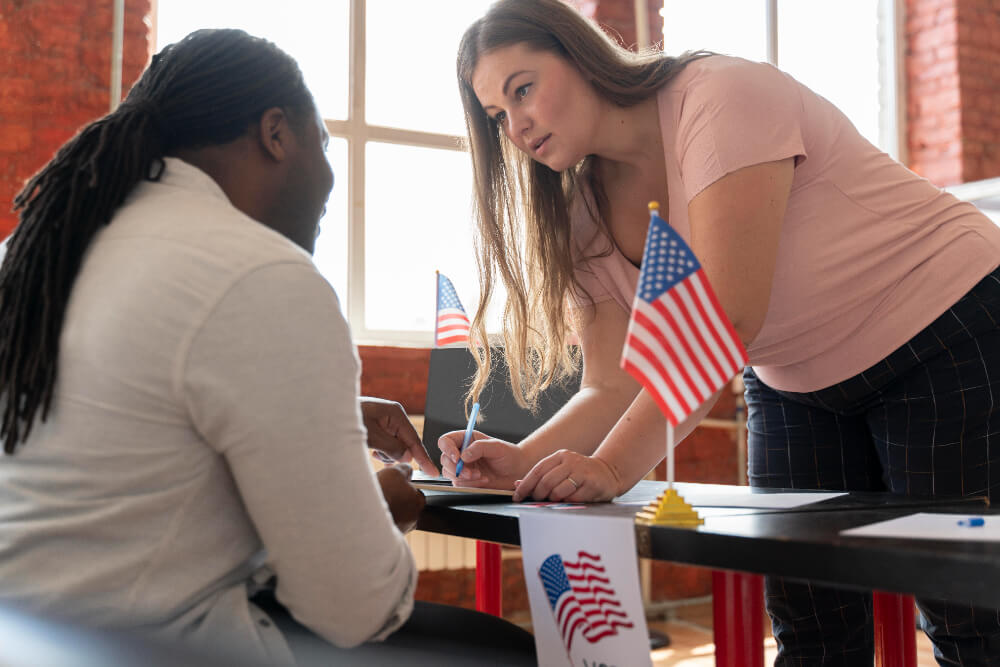American politics guide often intrigue those living in English-speaking countries outside the U.S.
The distinct political structure, campaign strategies, and electoral processes can be both fascinating and complex.
This guide aims to demystify American politics, providing clear explanations and relatable examples to help you grasp its nuances, and encourage a deeper understanding and appreciation of how politics operate across the Atlantic.

Common Questions and Concerns
When exploring American politics from an English context, you might have questions such as:
- How do the American political parties differ from those in the UK?
- What is the significance of the Electoral College?
- How do U.S. elections impact global politics?
- What are the major cultural differences in political engagement?
- How does the U.S. legislative process work?
- What role does the media play in American politics?
- How do political campaigns in the U.S. differ from those in the UK?
Political Parties: A Comparative Overview
In the U.S., the two main political parties are the Democrats and the Republicans.
Unlike the UK’s multi-party system, the American system is predominantly a two-party setup.
Relatable Example: Think of it like choosing between two major grocery stores in your town, each with its distinct vibe and customer base.
The Democrats are often compared to the UK’s Labour Party, emphasizing social equality and progressive reforms, while the Republicans share similarities with the Conservative Party, focusing on free market policies and traditional values.
Historical Background:
The Democratic Party, founded in 1828, is the oldest active political party in the United States.
It has traditionally been associated with progressive social policies, labor unions, and minority rights.
The Republican Party, established in 1854, emerged in opposition to the spread of slavery and has been linked with free enterprise, a strong national defense, and conservative social values.
Key Differences:
- Economic Policies: Democrats often advocate for higher taxes on the wealthy, increased social spending, and regulatory policies to protect consumers and the environment. Republicans typically support lower taxes, reduced government spending, and deregulation to stimulate economic growth.
- Social Issues: Democrats generally support abortion rights, LGBTQ+ rights, and gun control measures. Republicans often advocate for pro-life policies, traditional marriage, and the Second Amendment rights.
- Healthcare: Democrats push for expanded healthcare coverage, including government-funded options like the Affordable Care Act. Republicans aim to reduce government involvement in healthcare, favoring private sector solutions.
The Electoral College: Unpacking Its Significance
The Electoral College is a unique feature of U.S. presidential elections.
Instead of a direct popular vote, electors from each state cast votes based on the state’s popular vote.
Relatable Example: Imagine if your town’s favorite bakery decided the best cupcake flavor not by counting every individual vote, but by having representatives from each neighborhood cast the final vote based on their area’s preference.
How It Works:
Each state is allocated a certain number of electors based on its total number of Senators and Representatives in Congress.
There are a total of 538 electors, and a candidate needs a majority of 270 electoral votes to win the presidency.
Most states have a “winner-takes-all” system, where the candidate who wins the popular vote in that state receives all its electoral votes.
Only Maine and Nebraska use a proportional system.
Historical Context:
The Electoral College was established by the Founding Fathers as a compromise between electing the president by a vote in Congress and electing the president by a popular vote of qualified citizens.
It was designed to balance the influence of smaller states against larger states and to prevent any single region from dominating the national election.
Global Impact of U.S. Elections
American elections have a ripple effect worldwide due to the U.S.’s influential position in global politics.
Policies on trade, climate change, and international relations can shift significantly with each administration.
Relatable Example: Consider how the management style of a large, influential company can impact smaller businesses and even the local economy.
Key Areas of Impact:
- Trade Policies: Changes in trade agreements and tariffs can affect global markets. For example, the U.S.-China trade war impacted economies worldwide.
- Climate Policy: U.S. leadership on climate issues, such as rejoining the Paris Agreement under the Biden administration, influences global environmental strategies.
- Military and Defense: U.S. military actions and defense policies can affect global security dynamics, NATO relations, and international peacekeeping efforts.
- Foreign Aid: The U.S. provides substantial foreign aid, and shifts in this policy can impact development and humanitarian efforts globally.
Cultural Differences in Political Engagement
American political culture emphasizes individual participation and direct action, with a strong tradition of grassroots movements and activism.
This contrasts with the more institutionalized and party-driven political engagement in the UK.
Relatable Example: Think of American political engagement as a community potluck where everyone brings a dish, while in the UK, it might be more like attending a catered event where the menu is pre-decided.
Grassroots Movements:
- Civil Rights Movement: A historic example of grassroots activism leading to significant social change.
- Tea Party Movement: A conservative response to perceived government overreach, influencing the Republican Party’s direction.
- Black Lives Matter: A modern movement advocating for racial justice and police reform, demonstrating the power of social media in organizing and mobilizing supporters.
The U.S. Legislative Process
Understanding how a bill becomes a law in the U.S. can help demystify American politics. The process involves multiple steps and opportunities for input and amendment.
Step-by-Step Breakdown:
- Introduction: A bill is introduced in either the House of Representatives or the Senate by a member of Congress.
- Committee Review: The bill is assigned to a committee that specializes in the bill’s subject. It may be further divided into subcommittees.
- Debate and Amendments: The bill is debated and can be amended by committee members. If approved, it moves to the full House or Senate for further debate.
- Voting: The full House or Senate votes on the bill. If it passes in one chamber, it moves to the other chamber for a similar process.
- Reconciliation: If there are differences between the House and Senate versions of the bill, a conference committee works out a compromise.
- Presidential Approval: The final bill is sent to the president, who can sign it into law or veto it. Congress can override a veto with a two-thirds majority vote in both chambers.
Relatable Example: Think of it as baking a cake with several family members. Each person has a role in the process, and they all must agree on the ingredients and steps before the cake can go into the oven.

Role of the Media in American Politics Guide
The media plays a crucial role in shaping public opinion and political outcomes in the U.S. This includes traditional outlets like newspapers and TV, as well as digital platforms and social media.
Relatable Example: Imagine the media as the town crier, spreading news and opinions far and wide, but now amplified with the power of a megaphone and instant communication.
Media Landscape:
- Traditional Media: Major networks like CNN, Fox News, and MSNBC provide news coverage with varying political leanings.
- Social Media: Platforms like Twitter, Facebook, and Instagram have become pivotal in political campaigns and public discourse.
- Influence on Elections: Media coverage can impact voter perceptions and turnout. Debates, ads, and news stories shape the narrative around candidates and issues.
Political Campaigns: Comparing U.S. and UK Approaches
U.S. political campaigns are known for their length, expense, and intensity.
Campaigns often start years in advance of the election and involve extensive fundraising, advertising, and public appearances.
Relatable Example: Think of a U.S. campaign as a marathon where candidates pace themselves over a long period, while a UK campaign is more like a sprint, with a shorter, more intense effort.
Key Differences:
- Duration: U.S. presidential campaigns can last for over a year, whereas UK general elections have shorter campaign periods.
- Fundraising: U.S. campaigns require significant financial resources, with candidates and parties raising millions of dollars. UK campaigns have stricter spending limits.
- Media Strategy: U.S. campaigns heavily utilize TV ads, social media, and digital marketing. UK campaigns focus more on party broadcasts and direct voter engagement.
- Debates: Presidential debates in the U.S. are major events with high viewership, impacting public opinion. In the UK, leaders’ debates are important but have a shorter history.
Conclusion
Understanding American politics from an English context involves navigating complex structures, historical nuances, and cultural differences.
By breaking down these concepts into relatable examples and maintaining a conversational tone, this guide aims to make the intricacies of American politics more accessible and engaging for readers.
Whether you’re curious about the Electoral College, the impact of U.S. elections on global politics, or the role of the media, this comprehensive overview provides a solid foundation for further exploration and understanding.
Frequently Asked Questions
What is cultural diplomacy in the context of US-UK relations?
Cultural diplomacy refers to the exchange of ideas, information, art, and other aspects of culture between nations and their peoples.
In the context of US-UK relations, it involves the sharing of American political ideas, practices, and cultural elements with English audiences, and vice versa.
This exchange aims to promote mutual understanding and strengthen ties between the two nations.
How has the English language influenced the spread of American political ideas?
English has played a crucial role in promoting international cultural exchange, including the dissemination of American political concepts.
As English became the global language of business and diplomacy in the 20th century, it opened pathways for cultural convergence, allowing American political ideas to spread more easily to English-speaking countries and beyond.
What role do literature and media play in cultural exchange between the US and UK?
Literature and media serve as important vehicles for cultural exchange. American literature, particularly works addressing political themes, has been widely read and studied in English contexts. Similarly, British literature has influenced American political thought.
Media, including films, books, and other forms of popular culture, have become widespread, facilitating the exchange of political ideas and cultural norms.
How has cultural convergence affected American and British political systems?
Cultural convergence theory suggests that as interactions between cultures increase, they become more similar.
In the context of American and British politics, this has led to some shared political values, ideologies, and practices.
However, distinct differences in political systems and traditions remain, reflecting the unique historical and cultural contexts of each nation.
What are some challenges in interpreting American politics guide in English contexts?
Interpreting American politics guide in English contexts can be challenging due to differences in political systems, historical experiences, and cultural nuances.
Misunderstandings may arise from variations in terminology, institutional structures, and political traditions.
Additionally, the rapid evolution of political landscapes in both countries requires constant updating of knowledge and interpretations to ensure accurate understanding.


